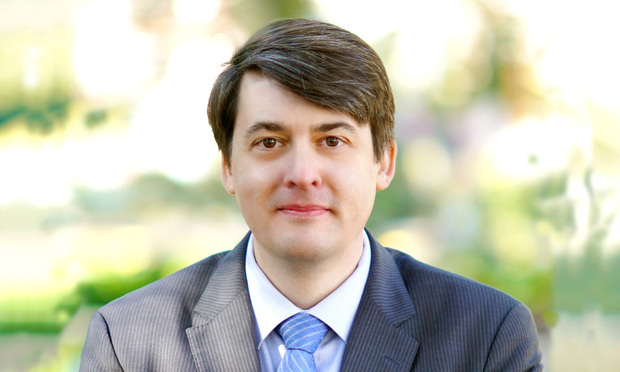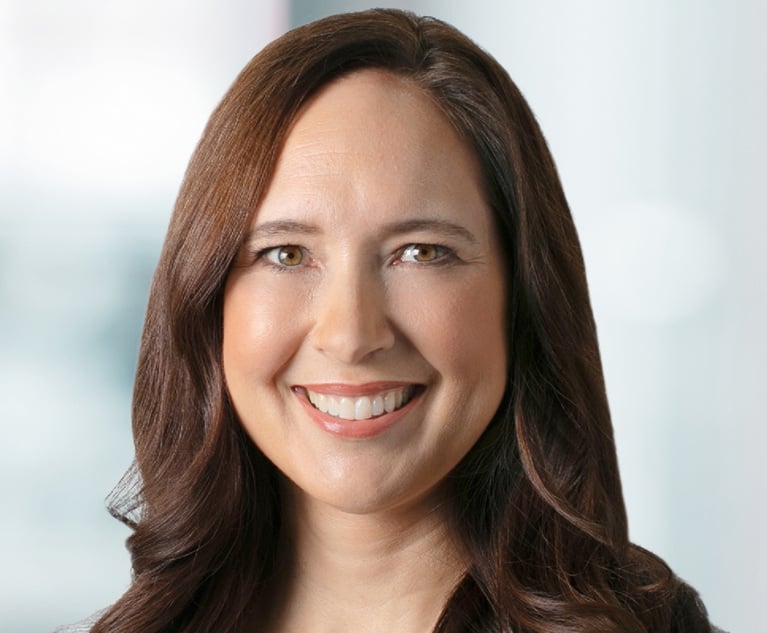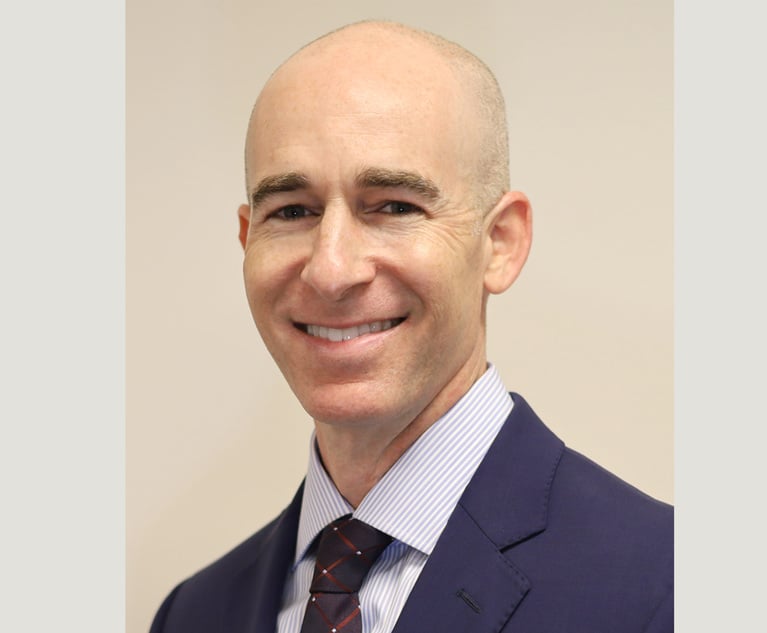Savannah Plaintiffs Firm Lands Another Top Federal Prosecutor
Brian Tanner, who was the appellate chief for the Savannah U.S. attorney's office, said he was recruited by Jim Durham, the office's interim U.S. attorney until joining Savage Turner in 2017.
February 26, 2019 at 01:49 PM
4 minute read
 Brian Tanner of Savage, Turner, Durham, Pinckney & Savage. (Courtesy photo)
Brian Tanner of Savage, Turner, Durham, Pinckney & Savage. (Courtesy photo)
Brian Tanner, one of the top prosecutors for the U.S. Attorney's Office in the Southern District of Georgia, has joined Savannah plaintiffs firm Savage, Turner, Durham, Pinckney & Savage.
The switch from a federal prosecutor to a plaintiffs attorney is somewhat rare, but Tanner was recruited by Jim Durham, who had been the first assistant U.S. attorney and then interim U.S. attorney for the Southern District of Georgia until he joined Savage Turner in September 2017.
“He's got one of the greatest legal minds of any attorney I've either litigated with or against,” Durham said. “He is that talented an attorney. But there are a lot of bright folks. He's also got judgment.”
Tanner, 42, who joined the firm at the end of last year, grew up in Savannah and Statesboro. After earning a law degree from Emory University, where he graduated second in his class, he clerked for Judge Myron H. Thompson of the U.S. District Court for the Middle District of Alabama and Judge Stanley F. Birch of the U.S. Court of Appeals for the Eleventh Circuit. Tanner then spent three years at Latham & Watkins in Chicago before landing the job in 2006 as an assistant U.S. attorney in Savannah.
He became the appellate chief for the Southern District of Georgia in 2010, and then, after Durham joined Savage Turner, spent two months as interim U.S. attorney until Bobby Christine was confirmed as the office's U.S. attorney in November 2017.
“Jim is a big reason I'm over here,” Tanner said, noting that a lot of federal prosecutors who decide to return to private practice “go to big firms in Atlanta with white-collar criminal practices.”
“I had a lot of conversations with Jim,” he said, adding that Durham told him plaintiff's work can be as sophisticated and complex as federal prosecutors' cases. “It's something I enjoy about the practice of law.”
“It was an easy decision to follow him over here and have as much fun as he said he was having,” Tanner said.
He said he was also impressed with other firm attorneys. “Brent Savage has been the head of this firm a long time. I've known him from Savannah—he's a huge part of legal scene here—and he has an intensity and passion for his clients, more than most lawyers,” he said.
“Brian has advanced trial and appellate skills,” Savage said in an email. “Bringing another former prosecutor on board is a big win for our clients.”
“It feels good to be fighting for a little guy,” Tanner added. “A gratifying part of working for the U.S. attorney's office is helping people who are victims of crime. In the private sector, it's gratifying being able to help people who've been injured and victimized.”
Tanner expands Savage Turner's appellate capabilities, where he is working with its longtime appellate point person, Kathryn Pinckney.
“One of his great gifts is the ability to preserve verdicts,” Durham said.
Tanner said he's carrying his own caseload and jumping in on the appellate side. “It's never too early to get [appellate] people involved. Avoiding the unfixable errors in your trial is as important as having a talented appellate team to preserve any verdict you get,” he said.
Tanner and Durham prosecuted some high-profile cases together, notably that of former Savannah Police Chief Willie Lovett. As co-prosecutors, the two won convictions against Lovett in a 2014 trial for aiding and abetting a gambling operation, extortion and false statements. Lovett received a 7.5 year prison sentence.
They also prosecuted a group of gas station operators in a multiyear gas-shorting fraud at three truck stops owned by Fairley Cisco on Interstate 95 near the Georgia-Florida border. Cisco and four others were charged with cheating customers out of millions of dollars by rigging the fuel pumps so that customers were shorted by five percent on gasoline or received a lower-octane fuel than they paid for. Cisco died a month before his 2010 trial, scheduled after the other four defendants had pleaded guilty.
The case spawned a federal class-action on behalf of defrauded consumers, in which Savage Turner initially participated, but the class action was decertified in 2014 over the defendants' lack of assets. Cisco's heirs and other defendants had earlier settled a separate state forfeiture suit for $2.75 million.
This content has been archived. It is available through our partners, LexisNexis® and Bloomberg Law.
To view this content, please continue to their sites.
Not a Lexis Subscriber?
Subscribe Now
Not a Bloomberg Law Subscriber?
Subscribe Now
NOT FOR REPRINT
© 2025 ALM Global, LLC, All Rights Reserved. Request academic re-use from www.copyright.com. All other uses, submit a request to [email protected]. For more information visit Asset & Logo Licensing.
You Might Like
View All
On The Move: Kilpatrick Adds West Coast IP Pro, Partners In Six Cities Join Nelson Mullins, Freeman Mathis
6 minute read

Trump Fires EEOC Commissioners, Kneecapping Democrat-Controlled Civil Rights Agency
Trending Stories
- 1Gunderson Dettmer Opens Atlanta Office With 3 Partners From Morris Manning
- 2Decision of the Day: Court Holds Accident with Post Driver Was 'Bizarre Occurrence,' Dismisses Action Brought Under Labor Law §240
- 3Judge Recommends Disbarment for Attorney Who Plotted to Hack Judge's Email, Phone
- 4Two Wilkinson Stekloff Associates Among Victims of DC Plane Crash
- 5Two More Victims Alleged in New Sean Combs Sex Trafficking Indictment
Who Got The Work
J. Brugh Lower of Gibbons has entered an appearance for industrial equipment supplier Devco Corporation in a pending trademark infringement lawsuit. The suit, accusing the defendant of selling knock-off Graco products, was filed Dec. 18 in New Jersey District Court by Rivkin Radler on behalf of Graco Inc. and Graco Minnesota. The case, assigned to U.S. District Judge Zahid N. Quraishi, is 3:24-cv-11294, Graco Inc. et al v. Devco Corporation.
Who Got The Work
Rebecca Maller-Stein and Kent A. Yalowitz of Arnold & Porter Kaye Scholer have entered their appearances for Hanaco Venture Capital and its executives, Lior Prosor and David Frankel, in a pending securities lawsuit. The action, filed on Dec. 24 in New York Southern District Court by Zell, Aron & Co. on behalf of Goldeneye Advisors, accuses the defendants of negligently and fraudulently managing the plaintiff's $1 million investment. The case, assigned to U.S. District Judge Vernon S. Broderick, is 1:24-cv-09918, Goldeneye Advisors, LLC v. Hanaco Venture Capital, Ltd. et al.
Who Got The Work
Attorneys from A&O Shearman has stepped in as defense counsel for Toronto-Dominion Bank and other defendants in a pending securities class action. The suit, filed Dec. 11 in New York Southern District Court by Bleichmar Fonti & Auld, accuses the defendants of concealing the bank's 'pervasive' deficiencies in regards to its compliance with the Bank Secrecy Act and the quality of its anti-money laundering controls. The case, assigned to U.S. District Judge Arun Subramanian, is 1:24-cv-09445, Gonzalez v. The Toronto-Dominion Bank et al.
Who Got The Work
Crown Castle International, a Pennsylvania company providing shared communications infrastructure, has turned to Luke D. Wolf of Gordon Rees Scully Mansukhani to fend off a pending breach-of-contract lawsuit. The court action, filed Nov. 25 in Michigan Eastern District Court by Hooper Hathaway PC on behalf of The Town Residences LLC, accuses Crown Castle of failing to transfer approximately $30,000 in utility payments from T-Mobile in breach of a roof-top lease and assignment agreement. The case, assigned to U.S. District Judge Susan K. Declercq, is 2:24-cv-13131, The Town Residences LLC v. T-Mobile US, Inc. et al.
Who Got The Work
Wilfred P. Coronato and Daniel M. Schwartz of McCarter & English have stepped in as defense counsel to Electrolux Home Products Inc. in a pending product liability lawsuit. The court action, filed Nov. 26 in New York Eastern District Court by Poulos Lopiccolo PC and Nagel Rice LLP on behalf of David Stern, alleges that the defendant's refrigerators’ drawers and shelving repeatedly break and fall apart within months after purchase. The case, assigned to U.S. District Judge Joan M. Azrack, is 2:24-cv-08204, Stern v. Electrolux Home Products, Inc.
Featured Firms
Law Offices of Gary Martin Hays & Associates, P.C.
(470) 294-1674
Law Offices of Mark E. Salomone
(857) 444-6468
Smith & Hassler
(713) 739-1250







